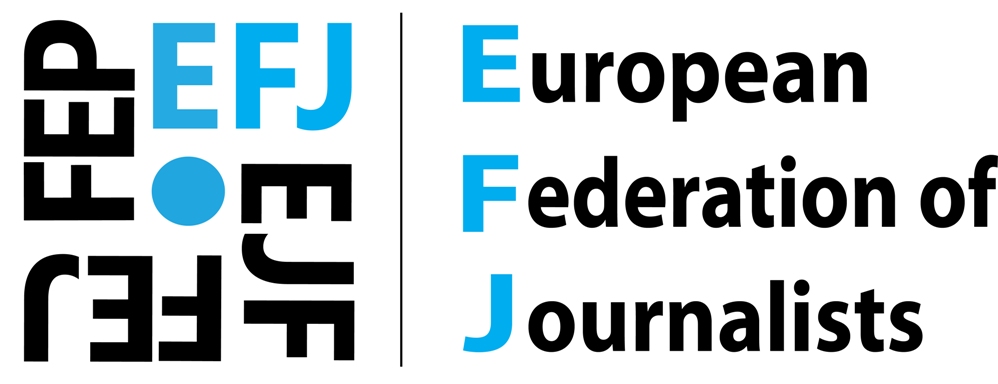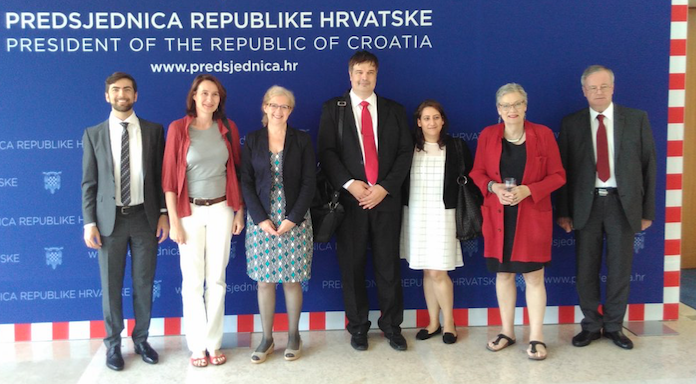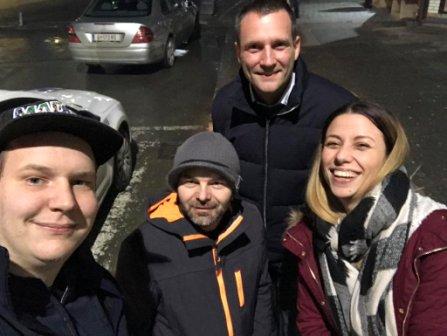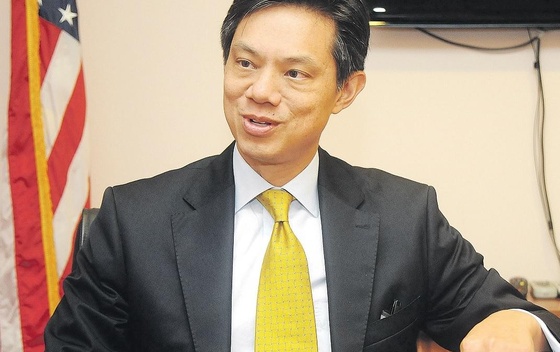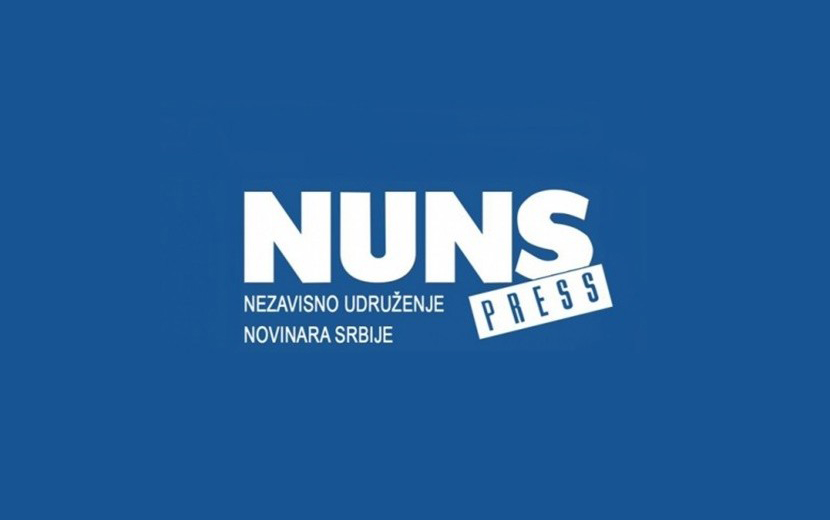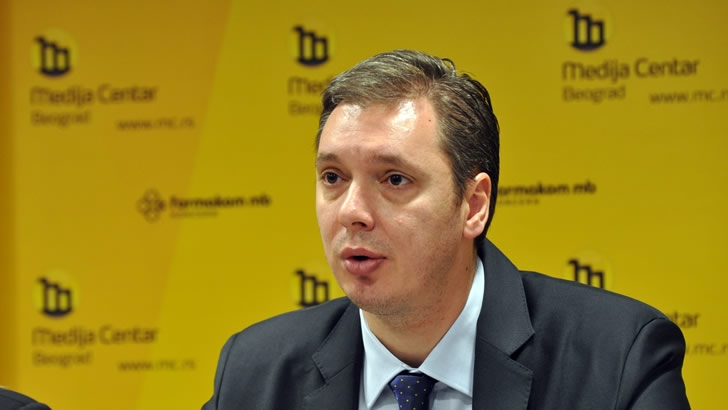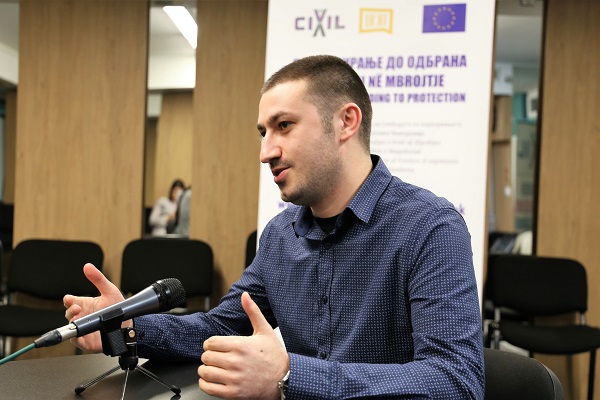PODGORICA, 10.01.2018 – The government should take steps to maintain RTCG editorial freedom or its democratic credibility will decrease, said U.S. Deputy Assistant Secretary of State Hoyt Brian Yee. During his talk with “Vijesti”, he said that taking political control over the Public Service could be a step backward on Montenegro’s Euro-Atlantic path.
“We are concerned that the Parliament has jeopardized the editorial independence of the Public Service with changes in its governing body, RTCG Council – the action which seems to have political motivation to limit the freedom of the media. The Government should urgently take steps to underline RTCG editorial freedom or the Government’s democratic credibility will decrease, which would be a step backward on the Euro-Atlantic path of Montenegro. More importantly, Montenegrin public could lose confidence in the Public Service whose duty is to provide independent and objective reporting to citizens”, said Yee when asked to comment on notices of the opposition, NGOs, and media that DPS is openly attempting to take over political control over RTCG.
- Experts- officials are talking about “re-engaging” the United States in the Western Balkans. What will the U.S. do in 2018 to prevent the region from slipping further into the deterioration of democracy, human rights, and the rule of law?
At least for the last quarter of the century, the U.S. is an active and important partner of the Western Balkans and we intend to continue that. Our primary goal during the mandates of several different U.S. administrations was to work with our partners to strengthen democratic institutions and implement the reforms necessary for Euro-Atlantic integration. This remains our priority.We are particularly committed to support strengthening of the rule of law, fight against corruption, and ensuring that governments are transparent and accountable. We will also continue to support strong independent voices, including journalists, non-governmental organizations, and other civil society members, who strive to build societies that are free, inclusive and prosperous.
- What will Washington do to prevent other players, such as Russia, China or Turkey, from making, sometimes damaging, influence on the Western Balkans, filling thus the vacuum, which was created, according to some interpretations, while Brussels, and especially Washington, dealt with themselves?
Far from ignoring the Balkans, the United States and the EU have actually intensified their support to the security, stability and economic development of the region. Montenegro’s accession to NATO, democratic transfer of power and renewed commitment to reforms in Macedonia, further steps of Serbia and Montenegro towards the European Union and judicial reforms in Albania are just some of the examples of successful cooperation between the Balkans, the EU, America and other related states in 2017.Nevertheless, in 2018 the governments in the region can and should make progress more rapidly, including setting aside politicization and use the advantages of the assistance and opportunities provided by international partners.
We believe that the future of the region lies in the West, but transparent, legal investments and assistance from other parts of the world can, as well, assist the Balkans achieve their goal of European and Euro-Atlantic integration. At the same time, governments have to resist the false friendship of some foreign actors who ignore international law or oppose the Western orientation of the Balkans. Russia, for example, has shown its readiness to interfere in elections, undermining the key institutions of the West, such as NATO and the EU, using energy supplies as a political weapon, and weakening confidence in democracy and the free market. We will continue to help our partners to strengthen the resilience to such malignant impacts, including the strengthening of police and judicial institutions, the fight against energy supply and the promotion of sustainable economic growth and Euro-Atlantic integration.
- You recently had said that it was shameful that Balkan political leaders, despite their undemocratic behavior, were welcomed in many European capitals, as if they weren’t doing anything wrong. Whom did you specifically have in mind?
My comment did not relate to anyone in particular. It is about the need to keep the undemocratic or corrupt Balkan leaders responsible. One of the methods is the way we welcome or do not welcome such leaders in our capitals. Politicians who are corrupt, who oppose the rule of law and the international community, encourage instability and tensions should not be given the opportunity to legitimize their undemocratic behavior through meetings and photographing with senior officials in European metropolises.
- In the Atlantic Council report “The Balkans Forward: A New US Strategy for the Region”, the authors warn of the so-called “Big Men” that are actively hindering the reforms, and they mention several leaders, including Milo Đukanović. You recently said that the partnership between the West and the Balkan leaders should be a two-way street, and that they are expected to fulfill their obligations. Do you think that these leaders deliberately do that to remain in power, and what can Washington do if they continue to do that?
I refer you to the Atlantic Council for a comment on the report. My statement referred to the kind of partnership that the United States wants with the Western Balkans. We will fulfill our obligations toward governments, whether it concerns assistance, technical advice or political support, and we expect those governments and leaders to fulfill their obligations, for example to implement reforms or respect the rule of law. We will work with those officials who adhere to the rule of law and share our commitment to democratic and economic development. Leaders, of course, are firstly and foremost responsible to the ones who elect them, who are free to choose a new one.
- What do you think about Đukanović’s recent comments in which he has labeled independent media as a “media mafia”?
All political leaders have the responsibility to respect the freedom of the media, which is one of the pillars of democracy. The United States is joining the European Union in emphasizing the need for Montenegro to show significant progress in protecting journalists and maintaining media freedom. Freedom of media enables a forum for all society members, and not just those having power. Political leaders have the responsibility to ensure that the government properly investigates physical attacks on journalists. On the other hand, the media is obliged to report independently and responsibly.
- There was a collapse of the opposition boycott of the Parliament and 21 opposition MPs returned to it. Is this a good step towards the solution of the crisis, despite the high tensions and insults at all sessions up to now? What should the rest of the opposition do?
During the past year, we encouraged politicians from different sides to jointly work in the Parliament, where they can represent the best interests of the citizens of Montenegro. The message remains the same. Elected representatives of citizens cannot fulfill their duties if they stay aside and only selectively engage in discussions or if they focus on spreading instability. Citizens throughout the Balkans want their leaders to solve problems, not just to complain and accuse each other. Montenegro faces very important challenges. It is necessary that all of its elected officials participate fully in the political process, present their voters and work for the common good of their country.
- There is an ongoing trial for alleged attempted coup in Montenegro. Political and public opinion is divided about whether something really happened or not, and to what extent, if at all, Montenegro was at risk. Based on the evidence which the U.S. helped investigate and what you know, what do you think about that event and the trial that followed?
The trial is still ongoing, but the evidences presented so far clearly indicate the interference of Russia and the brazen attempt to disrupt the independent electoral process in Montenegro. Continuous dissemination of disinformation and propaganda campaign aspire to discredit public confidence in the special prosecution and judiciary. Probably RT, Sputnik and state-sponsored trolls will continue these activities in 2018. We call on responsible independent media to inform the public about it and help citizens to differentiate facts from fiction.
Credibility of elections remains a priority
- Would it be good or bad for Montenegro if Đukanović runs for president?
Who will or will not participate in the elections is not an issue for the United States. That is a decision that politicians, parties and voters should make. We are interested in the credibility of the election process, whether the campaigns are fair, transparent, and meet international standards. Can anyone run for elections on the basis of his/her own merits? Are Montenegrin citizens free to vote for candidates of their choice? Do institutions provide a forum where citizens’ voices will be heard during free and fair elections? We are not speaking about individuals here but about rules, norms, and institutions that represent a strong democracy.
The authorities and the opposition have to find a way to jointly solve problems
- What should the Montenegrin authorities, the opposition, civil society and the media do in 2018 in order to solve political crisis which goes on lasts since 2016 elections?
The current political situation hampers Montenegro’s progress towards European integration, supported by the vast majority of Montenegrin citizens. All those who are interested in the political and economic well-being of Montenegro should do what they can to solve the political stalemate, in accordance with the Constitution and European standards. In every democracy it is normal for parties to have disagreements. However, it is high time that the ruling and opposition parties find a way to work together to solve some of the urgent challenges facing the country, including how to strengthen the economy and convince young Montenegrin citizens not to leave the country. Journalists and civil society should assist in informing the public about the most important issues and current events, and serve as controllers of abuse of power. Citizens should clearly communicate to their elected leaders that they want results and functional democracy, and not empty posing and stagnation.
Protests and riots are possible if promised improvements are not achieved
- In its Preventive Engagement Report, the Council on Foreign Relations’ identifies the Balkans as one of the 30 potential “hot spots” in the world, warning on possible political riots and extremist violence in the region, even re-drawing some borders. How real are these threats in the region?
The region faces serious challenges – external and internal threats that, if left unanswered, can cause serious consequences for the aspirations of the Western Balkan countries. Fragile institutions, poor rule of law and lack of media freedom provide endemic corruption, discourage foreign investment, and force citizens to emigrate into more stable and prosperous countries. Protests and riots can also occur if governments fail to meet the promised improvements in governance and living standards. Poor economic conditions also open up paths for potentially destabilizing things such as violent extremists, organized crime, and states with malignant influences. The United States will continue to provide funding and technical assistance to help governments in the Balkans counteract these threats and harmful actors who want to weaken institutions, undermine reforms and prevent progress of the region.


